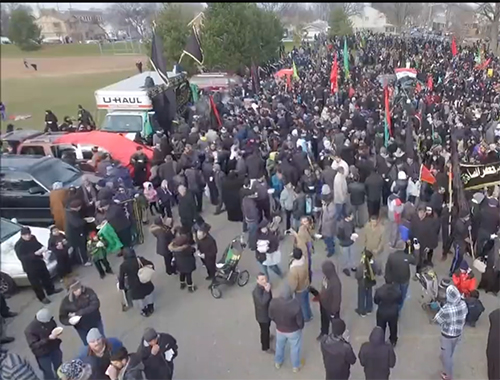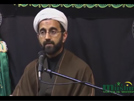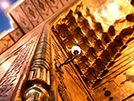3. Commencement of the Mission
- Details
- Hits: 2022
3. Commencement of the Mission
At the age of forty, while busy in worship in the cave of Hira, he was proclaimed as the Messenger of God.
For three years, the Prophet of Islam received no command to call the people openly to Islam, and during that time only a few people had accepted the message of God brought by Muhammad (s.a.w.). Among men, the first person who loved and followed him was Imam ‘Ali (a.s.), and among women, Khadijah[4].
Then after three years, he received the command to invite people openly to Islam. First he invited his relatives as guests; about forty of them assembled together. The food which the Prophet had prepared was no more than enough to satisfy the appetite of one man, but by the power of God that little food filled everyone, and this was the cause of much amazement. Abu Lahab, without thinking what he was saying, cried out: “Muhammad is a magician!” That day the relatives dispersed before the Prophet could speak. So he called them again the next day. After they had partaken of the food and hospitality, he spoke: “O Sons of `Abdul Muttalib! No youth has brought to his people better than what I bring to you. I have brought to you the best of this world and of the here-after. I have been commanded by God to call you to Him. Which of you will extend his help to me and become my brother and successor?” Apart from ‘Ali (a.s.), no one answered. The Prophet placed his hand on ‘Ali's shoulder and said, “This is my brother, the executor of my will and my successor among you. Listen to what he says and obey him.”[5]
One day the Prophet went up on to Mount Safa and called the people around him. He said, “If I told you that an enemy was going to fall on you this morning or this evening, would you trust me?” All together they replied, “Yes!” He said, “I warn you of a severe torment that is soon to fall on you.” Out of fear that the speech of Muhammad (s.a.w.) would take effect in the hearts of those present, Abu Lahab broke the silence and said to him, “Did we assemble here just to listen to this nonsense?”
The Prophet of Islam started his call with the slogan of tawhÄ«d and the worship of one God, and established tawhÄ«d as the basis of all other beliefs. He made known to men AllÄh, who is nearer to man than man himself; he abolished all forms of idol-worshipping, revolutionized the atmosphere of Mecca, and drew people to his religion.
Meanwhile, the Quraysh (the most powerful tribe in Mecca to which the Prophet belonged) were becoming ill at ease with the progress he was making and tried hard to stop his preaching, even once trying to kill him; but with the help and protection of God all their tortures, persecutions and schemes were without effect and came to nothing. Day by day the call to Islam, and also the acceptance by people, spread, even to those who came from outside Mecca. People rose up with their souls in answer to this Divine invitation.
In the eleventh year of the prophethood, some people from the tribe of Khazraj of Medina came to Mecca to perform the pilgrimage. The Prophet invited them to Islam and they accepted, with the promise that when they went back to Medina they would call the people to Muhammad's religion. They went to Medina and spread the invitation of the Prophet. The next year, twelve Medinese accepted the faith of the Prophet of Islam at Aqaba and resolved: not to associate anything with Allah, not to steal, not to fornicate, not to indulge in infanticide, not to bring malicious accusations against anyone, not to disobey the Prophet in any thing which he indicated. Then the Prophet sent a man by the name of Mus`ab bin `Umayr with them to teach the Qur'Än, and thus a large group in Medina pledged their faith in the Prophet.







![take advantage of your [present] time](/en/media/com_hwdmediashare/files/99/f5/fb/5293162f4d04afb1ed8da3034e984340.jpg)



